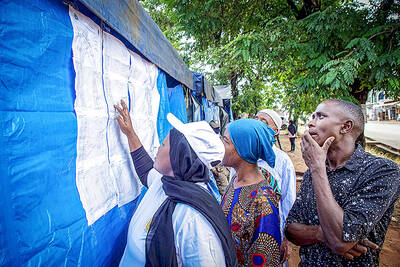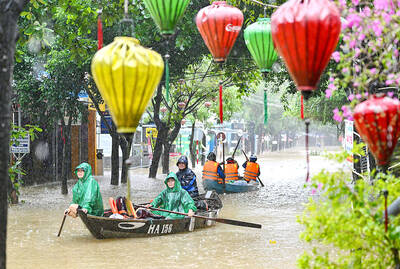Crocodiles can surf ocean currents to take long, leisurely journeys across open seas in the South Pacific, a researcher said yesterday.
The research by a group of Australian ecologists published this week in the British Ecological Society’s Journal of Animal Ecology explains how the world’s largest living reptile came to occupy so many South Pacific islands despite having little stamina for swimming.
Like a surfer catching a wave, estuarine crocodiles — which can grow up to 6m — can ride currents to cross hundreds of kilometers of open sea, study author Hamish Campbell said.
The research began in 2002 in the tropics of Australia’s Queensland state and involved environmentalist and television personality Steve Irwin, the so-called Crocodile Hunter who was killed by a stingray barb off Queensland in 2006.
Campbell, a University of Queensland ecologist, teamed up with government rangers and the Irwin family’s Australia Zoo to tag 27 adult crocodiles in the Kennedy River. They used sonar transmitters and underwater receivers to track their movements over 12 months.
Campbell said a 20-minute swim is hard work for a crocodile, so he was surprised that eight of the tagged crocodiles repeatedly took long journeys out to sea from their river home area that was more than 60km upstream.
“It did seem unlikely that they were swimming the entire way and when we looked at residual surface currents from satellite [images], you could see quite clearly that they were indeed following the current systems,” Campbell said.
One 3.8m male swam 590km over 25 days to another river system where it stayed for seven months before returning.
“Why he went there, we have absolutely no idea, but it seems very deliberate, purposeful movements,” Campbell said.
He said the research showed that currents could carry crocodiles — which can survive for months without food or fresh water — across vast tracks of ocean.
The research also explains why the same species of estuarine crocodile is found in various countries separated by seas.
Zoologist Grahame Webb, an Australian crocodile expert independent of the study, welcomed the research as the first demonstration of how crocodiles use currents.
“Long distances voyages at sea have always been a bit rare with crocs, and people have suspected that currents played a part,” Webb said. “The research shows they’re much more mobile than people realize, and how they can be so energy-efficient that a giant reptile weighing nearly a ton can survive on one or two chickens a week.”
Large crocodiles are powerful, but tire quickly. A 20-minute struggle in a trap can kill a crocodile, because exertion causes a rapid buildup of lactic acid in their blood, Webb said.
Estuarine crocodiles mainly live in rivers and mangroves in a range extending over more than 10,000km² of the Southeast Pacific from India to Fiji and from China to Australia.

With much pomp and circumstance, Cairo is today to inaugurate the long-awaited Grand Egyptian Museum (GEM), widely presented as the crowning jewel on authorities’ efforts to overhaul the country’s vital tourism industry. With a panoramic view of the Giza pyramids plateau, the museum houses thousands of artifacts spanning more than 5,000 years of Egyptian antiquity at a whopping cost of more than US$1 billion. More than two decades in the making, the ultra-modern museum anticipates 5 million visitors annually, with never-before-seen relics on display. In the run-up to the grand opening, Egyptian media and official statements have hailed the “historic moment,” describing the

‘CHILD PORNOGRAPHY’: The doll on Shein’s Web site measure about 80cm in height, and it was holding a teddy bear in a photo published by a daily newspaper France’s anti-fraud unit on Saturday said it had reported Asian e-commerce giant Shein (希音) for selling what it described as “sex dolls with a childlike appearance.” The French Directorate General for Competition, Consumer Affairs and Fraud Control (DGCCRF) said in a statement that the “description and categorization” of the items on Shein’s Web site “make it difficult to doubt the child pornography nature of the content.” Shortly after the statement, Shein announced that the dolls in question had been withdrawn from its platform and that it had launched an internal inquiry. On its Web site, Le Parisien daily published a

UNCERTAIN TOLLS: Images on social media showed small protests that escalated, with reports of police shooting live rounds as polling stations were targeted Tanzania yesterday was on lockdown with a communications blackout, a day after elections turned into violent chaos with unconfirmed reports of many dead. Tanzanian President Samia Suluhu Hassan had sought to solidify her position and silence criticism within her party in the virtually uncontested polls, with the main challengers either jailed or disqualified. In the run-up, rights groups condemned a “wave of terror” in the east African nation, which has seen a string of high-profile abductions that ramped up in the final days. A heavy security presence on Wednesday failed to deter hundreds protesting in economic hub Dar es Salaam and elsewhere, some

Flooding in Vietnam has killed at least 10 people this week as the water level of a major river near tourist landmarks reached a 60-year high, authorities said yesterday. Vietnam’s coastal provinces, home to UNESCO world heritage site Hoi An ancient town, have been pummeled by heavy rain since the weekend, with a record of up to 1.7m falling over 24 hours. At least 10 people have been killed, while eight others are missing, the Vietnamese Ministry of Natural Resources and Environment said. More than 128,000 houses in five central provinces have been inundated, with water 3m deep in some areas. People waded through